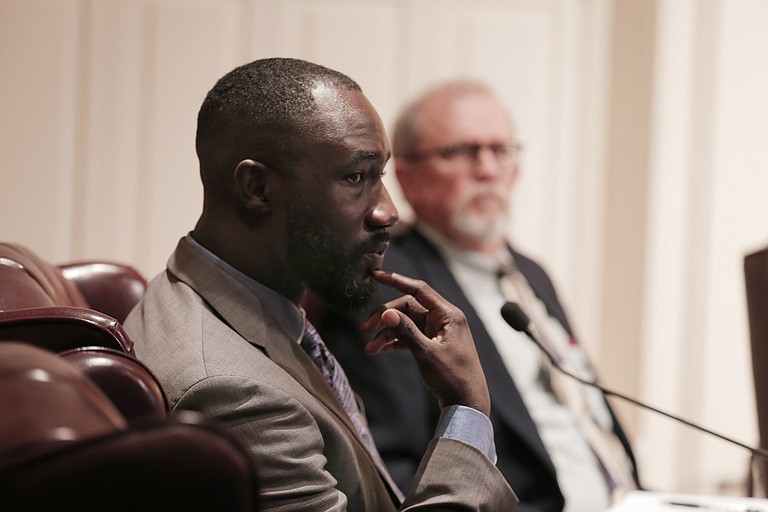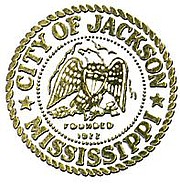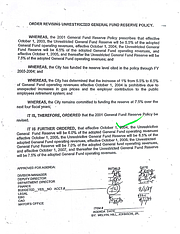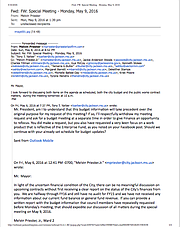Mayor Tony Yarber's administration has dodged questions from the City Council about the budget shortfalls. Photo by Imani Khayyam.
Tuesday, May 10, 2016
Documents, including emails, released to the Jackson Free Press indicate that despite protestation from Mayor Tony Yarber and his administration, the City has been dipping into the ordinance-protected reserve fund to fill in shortfalls from last year's budget.
A memo dated May 2 from Jackson's Director of Administration Michelle Battee-Day, sent to Mayor Yarber, Chief Administration Officer Gus McCoy and Robbi Jones of Kipling Jones and Co., shows that the city had to dip into the emergency-fund reserve to meet the demands of last year's budget.
"Based on an ordinance approved by the city council, the requirement for the unreserved fund balance in the general fund is 7.5 percent of the adopted revenue," the memo states. "The FY15 adopted revenue budget was $122,378,560 of which 7.5 percent ($9,178,392) should be set aside as fund balance."
"My question," Ward 7 Councilwoman Margaret Barrett-Simon asked at a special council meeting on May 9, "is how in the world when we have set the reserve by ordinance many years ago ... that that could be depleted to the point that it is right now."
"We did this many years ago to ensure the financial stability of the city, and if this has been violated, that's a very, very serious situation."
Municipal ordinance has required this "fund reserve" since 2004, which is designed to be the City's ace-in-the-hole for any budget shortfalls or unforeseen expenditures, along with the "fund balance," or the amount left over from the previous year's budget.
The memo states that the City had a carryover from fiscal-year 2014 of $16,168,423. This "fund balance" is a common practice with municipalities, and from that the "fund reserve," required by ordinance, was set aside, in an amount of $9,178,392, or 7.5 percent of the total revenue for the City. This amount was designed as an emergency fund to cover any unforeseen expenditures including those incurred during natural disasters, like seasonal hurricanes that hit the region.
So, then, for the fiscal-year 2015 budget the city had a cushion of $6,990,031 to cover any shortfalls for the budget that the administration crafted and the council approved.
However, after using the $6 million to fill in the fiscal-year 2015 budget, "unfortunately, at FY15 year end, the City needed $11,177,398 to close out the budget, creating a deficit of $4,187,367," the memo states.
"We have been saying since 2014 that the practice of using the fund balance to balance the budget was going to catch up with us," Mayor Tony Yarber said in a statement May 9. "That is the reason we started the transition to priority-based budgeting last year."
"It's also what we knew would happen after the FY16 budget proposed by the Administration was greatly augmented by the City Council before final approval. What we are seeing should not be a shock to anyone," he added.
Whether or not the mayor had warned of the problems with using the "fund balance" to cover the budget, the City had to cover the $4 million from somewhere, and so they pulled from the emergency "fund reserve," which meant that the amount for that account would fall below the ordinance-required 7.5 percent.
Yarber called the special meeting on Monday, May 9, to talk about public-works contracts, but the council added the reserve question to the agenda in advance of the meeting. Yarber, citing conflicts with the Levee Board meeting in Rankin County, sent Deputy Chief Administration Officer Marshand Crisler in his stead.
Council President Melvin Priester Jr. asked Crisler about the budget numbers, who responded that the mayor wanted to push back the meeting until he could be present.
"And at this point," Crisler said, "the mayor did indicate that if the issue came up about the fund balance, and the budget as a whole and the audit, that he respectfully requests that he be given the opportunity to be present at the meeting and that we recess that meeting until it be done."
Copies of emails between city officials, including council members and the mayor, indicate that the mayor tried to back out of the meeting when the council added the budget questions to the agenda.
"Mr. President," Yarber wrote to Priester in the email chain, "am I to understand that this budget information will take precedent over the original purpose for my request of this meeting? If so, I'll respectfully withdraw my meeting request and ask for a budget meeting at a separate time in order to give Finance an opportunity to refocus."
Finance, however, had already informed the mayor of the issue more than a week earlier. The department also warned that the draw on the fund reserve balance could affect the still-incomplete audit of the city's finances, even if the city decided to alter the amount required under the ordinance from 7.5 percent to 3 percent of the total revenue.
"Should the City choose to not lower the fund balance requirement, we will receive a negative finding on the FY15 audit," Battee-Day wrote in the May 2 memo to the mayor. "Although, lowering the requirement is not the ideal choice it does serve as a mechanism to avoid the negative finding. Unfortunately, we were not informed of this potential mitigating action until our audit firm returned to the City on Thursday, April 28."
Not only has the administration known in some degree the budget problems since April 28, Battee-Day stated in her May 2 memo that she could have had an agenda item prepared to address the ordinance with the city council by mid-day May 3.




Comments
Use the comment form below to begin a discussion about this content.
Sign in to comment
Or login with:
OpenID